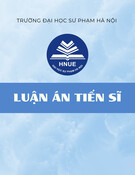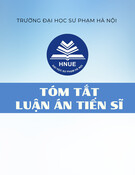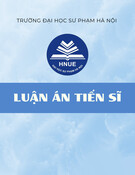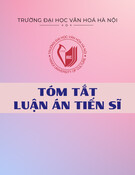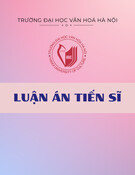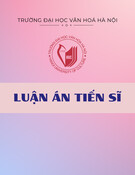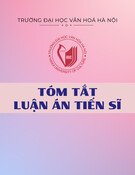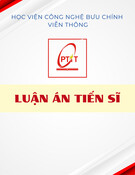MINISTRY OF EDUCATION AND TRAINING HANOI NATIONAL UNIVERSITY OF EDUCATION
TRINH THI HUONG
MANAGING VILLAGES IN THAI BINH PROVINCE
THROUGH THE CONVENTIONS FROM 1921 TO 1945
Specialization: Viet Nam History
Code: 9.22.90.13
Summary Of PhD thesis IN HISTORY
hanoi – 2021
THE WORK IS COMPLETED AT:
HANOI NATIONAL UNIVERSITY OF EDUCATION
Science instructors: 1. Assoc.Prof. PhD Nguyen Duy Binh
2. Assoc. PhD Nguyen Thi Thu Thuy
Reviewer 1: Assoc.Prof. PhD Nguyen Dinh Le
VNU University of Social Sciences and Humanities
Reviewer 2: Assoc.Prof. PhD Nguyen Duc Nhue
Institule of History
Reviewer 3: Assoc.Prof. PhD Pham Van Luc
Ha Noi Pedagogical University 2
The thesis will be defended in front of the Thesis Evaluation
Committee at department level at Hanoi National University
of Education
At…. hour….on the …. day of 2021
The thesis can be found at the library:
- National Library
- Library of the Ha Noi National University of Education
LIST OF THE WORKS OF THE AUTHOR
RELATED TO THESIS
1. Trinh Thi Huong (written together with Assoc. Prof. Dr. Nguyen
Duy Binh, Nguyen Thi Hue) (2014), “Conservativeness of the
reformed village of Dong Ky and Vinh Kieu villages, Tu Son district,
Bac Ninh province (1921- 1945) ”, Southeast Asian studies Journal,
No. 7 (172) 2014, pp.65-70.
2. Trinh Thi Huong (2017), "Traditional education in traditional
villages in the North region through some modern conventions",
Journal of Education, special issue, August 3, 2017, p. 256-259.
3. Trinh Thi Huong (written together with Associate Professor, Dr.
Nguyen Duy Binh, Master Nguyen Van Bieu) (2014), "Village in
Cochinchine through foreign research" // Proceedings of Scientific
Conference: Southern Vietnam From 1698 up to now, through the
study of foreigner, Thu Dau Mot University, Binh Duong, 8-2017,
p.43-54.
4. Trinh Thi Huong (2018), "Value of the conventions in Thai Binh
communes in awa awareness education, personality form for high
school students", Education Magazine, No. 440 , October 2, 2018,
pp.256-259.
5. Trinh Thi Huong (2017), "The incense of the village of Da Nguu in
the name of Pho Duc Chinh". Document of the Scientific Seminar:
"Pho Duc Chinh - Dai Dai can not die is the honor and uprising of
Yen Bai", Hanoi, December 2017, pp.319-328.
1
INTRODUCTION
1. Reasons for selecting the topic In the development process of Vietnamese history, the village always played an important role. The issue of village management is always the
most important issue of the state. Currently, in the context of the country accelerating the construction of new rural areas, the issue of village management is even more important.
The convention plays an important role in traditional Vietnamese
village life, more noticeably as a village management tool. Studying village management issues through the convention will provide
lessons for the organization of new management systems and new rural management practices. The study of village management through reformed village
conventions in Thai Binh not only helps to better understand Thai Binh village, but also thereby better understand the French rule policy for our country.
Therefore, the study of village management through reformed village convention in Thai Binh is deeply scientific and practical. For the above reasons, the author chooses the topic of “Managing villages in Thai Binh
province through the conventions (1921-1945)” to be the subject of his thesis.
- Presenting an overview of the village management before 1921 and
2. Research purposes and tasks 2.1. Research purposes the village and village management convention in Thai Binh. - Clarify the economic, administrative and cultural management in Thai Binh village and commune through the reformist convention from
1921 to 1945. - Draw some comments on the village management through the reformist convention in Thai Binh province from 1921 to 1945 as lessons
for the current management of Vietnamese villages.
2
2.2. Research tasks
- The study clarifies the basic features of the emergence of the reformist
convention (1921-1945) in Thai Binh, such as about the Vietnamese village in Thai Binh, the main French reformist work in Thai Binh.
- Analyzing the rural convention, the current state of
the characteristics of the form and content of the reformed village convention
(1921-1945) in Thai Binh.
- Analyzing and clarifying the contents of administrative, economic, cultural and social management for villages and communes through the
village's village and communal regulations (1921-1945) in Thai Binh.
- Evaluate and draw lessons from the practice of village management in Thai Binh through the reformist convention (1921-1945) to serve the
in particular,
management of villages, farmers, and rural areas management. current general state.
3. Subjects and scope of research
3.1. Research subjects The research object of the thesis is the management of villages in Thai Binh through the reforms of Thai Binh province, which are still
stored at the Vietnam Academy of Social Science and Library of Thai Binh province.
3.2. Research scope Scope of time: The thesis focuses on researching the documents on the reform of Thai Binh province, established in the period from 1922 to 1944, and archived at the Vietnam Institute of Social Science Information. Space scope: The boundaries of Thai Binh province in the period 1921-
1945 have changed and adjusted compared to the present. However, the topic is only researched in the space of current Thai Binh villages. Scope of content: With 452 copies of Thai Binh's reformist
thesis focuses on understanding the
convention (1921-1945), the administration, economics, culture and society of Vietnamese villages. in
3
Thai Binh in the period 1921-1945. In the content of administrative management, the thesis will focus on understanding the administrative
organization, functions, tasks, standards of the village management apparatus, Salary, allowances, rewards and penalties for the management apparatus. village management, the purchase and sale of officials in the village management apparatus. In the content of economic management,
the thesis focuses on learning about land management, management of revenue and expenditure, and tax collection; general property management; agricultural production management and protection. In the
content of cultural and economic management, the thesis focuses on educational management, customary management (marriage, funeral).
History sets, books, documents; The reformed versions of Thai Binh
4. Resources: convention in 1921-1945 period; Field documents.
5. Methodology and methods of research 5.1. Methodology: dialectic of historical materialism. 5.2. Methods of research: Two specialized methods are historical and logical. In addition, the
writer also uses other auxiliary research methods such as analysis, statistics, fieldwork, ...
the Firstly, thesis presents quite comprehensively about
6. New contributions to the science of the thesis the convention, the management of the village through the reformed village convention (1921-1945) along with reconstructing the appearance of the contemporary Thai Binh village.
Secondly, through exploiting the original source and reference materials, the thesis re-elaborates in detail, fully and comprehensively the contents of village management in Thai Binh province in terms of
, culture through the reformed
administration, economy, society. convention (1921-1945).
4
Thirdly, the thesis highlighted the advantages and limitations in the management of villages through the reformed salary convention in 1921-
1945 period, drawing some lessons for the administrative reform in the locality. present method. Fourthly, the thesis collects and systematizes documents related to Thai Binh village, reformed convention in Thai Binh, and village
management in Thai Binh period from 1921-1945.
7. Thesis structure In addition to the Introduction, Conclusion, References and
Appendices, the content of the thesis includes 5 chapters: Chapter 1: Overview of research related to the topic Chapter 2: An overview of village management before 1921 and the
Chapter 3: Economic management in Thai Binh village through the
village reform village in Thai Binh reformist convention from 1921 to 1945
Chapter 4: Administrative and cultural management in Thai Binh
village through the reformist convention from 1921 to 1945 Chapter 5: Some comments on the village management through the
reformist convention in Thai Binh province from 1921 to 1945
5
Chapter 1
OVERVIEW OF THE RESEARCH SITUATION
1.1. Research works on village regulations and village management
through traditional conventions (before 1921)
1.1.1. The works of foreign scholars
Before the August Revolution: La Commune Annamite au Tonkin,
Les paysans du Delta Tonkinois.
Since the August Revolution in 1945: Village in Vietnam, Law and
Society of Vietnam in the 17th and 18th centuries of Insun Yu, Facing the
Future, Reviving the Past: A Study of Social Change in a Northern
Vietnamese Village (Vietnamese Village Faces the Future to Revive the
Past: A Study of Social Change in a North Vietnamese Village) by John
Kleinen, ...
Research projects and programs: Vietnam and France cooperation
program: Research on Vietnamese villages in the Red River Delta (1996 -
1999). Vietnam - Japan cooperation program: Rural, agriculture and Red
River Delta villages through the case of Bach Coc village was
implemented from 1993 to 2013.
1.1.2. Works of domestic scholars
1.2.1.2. Research of domestic authors
Before the August Revolution: Propriété communale au Tonkin,
Recherche sur la Commune Annamite, La Civilization annamite, Problem
of plowing, ...
Since the August Revolution of 1945: Vietnamese village of Nguyễn
Hồng Phong, The organizational structure of the traditional Vietnamese
village in the North of Tran Tu, Land regime in Vietnam from the 11th to
18th centuries of Truong Huu Quynh,... In many magazines also published
many articles about villages.
6
1.2. The research works on Cai Luong Convention, village management through reformed village convention 1.2.1. Works by foreign scholars: L’Indochine française by Paul Doumer.
1.2.2. Works of domestic scholars Articles: Main flavor reformed reformed, Traditional reformed incense, Discussing the issue of reforming the main flavor, Talking about
the origin of Tonkin, ... Dao Duy Anh with Vietnam history culture, Nguyen Hong Phong with Vietnam Village Commune, Bui Xuan Dinh with Le Village allowed
the country and Huong Convention and village management, ....
1.3. The research works on Thai Binh village, managing the village through the convention of Thai Binh.
Histoire du royaume de Tunquin (1651), Histoire naturelle, civile et
1.3.1. The works of foreign scholars politique du Tonquin, Notice sur la province de Thai Binh,….
1.3.2. Works of domestic scholars villages and conventions: Thai Binh style * The research works on Thai Binh that are more or less related to journalism, Thai Binh
geography, Information Culture Publishing House, village culture in Thai Binh, .... * The works directly write about Thai Binh convention: Thai Binh
village convention, Thai Binh village cultural identity, ...
1.4. A few comments on the resources, the situation of research on issues related to the thesis and issues that need further clarification. 1.4.1 Comment on the resources and the situation of researching the
issues related to the thesis topic The issue of village, village convention, reformed village convention, village management by reformed village convention has been interested by
many people.
7
Most of the projects reflect the importance of reformed village convention in village management. Continuing to delve into village
Regarding the issue of village management in Thai Binh through
management through the reformed village convention is still necessary. reformed village conventions, through document contact, we found that: the convention of reforming and the villages, Firstly, the
management of the villages in Thai Binh were studied. However, no work has presented systematically, fully and deeply on this issue. Second, the Thai Binh Convention of Nguyen Thanh is just a
documentary work. 1.4.2. Issues that need further clarification: the thesis will focus on solving the following issues:
Systematize the sources of documents, clearly state the form and
content of the reformed convention in Thai Binh. Presenting and analyzing clearly the management of villages in Thai
Binh through the reformed convention (1921-1945) on the following aspects: administrative management, economic management, social management, cultural management.
From the study of village management in Thai Binh through the reformed convention (1921-1945), lessons can be drawn, contributing to the administrative reform and building a new rural area. now on.
8
Chapter 2: OVERVIEW ON COMMUNITY MANAGEMENT BEFORE 1921 AND THE WAGE REFORM IN THAI BINH
2.1. Overview of Thai Binh village management 2.1.1. An overview of Thai Binh province This section presents issues of geographical location, natural conditions, historical overview, population, cultural traditions of Thai Binh province.
2.1.2. Thai Binh village In terms of quantity: The thesis takes 819 villages and communes according to the book Name of villages and geography of Bac Ky and Thai Binh provinces for
the main data. Scale: Villages in Thai Binh differ in size, area and population. In general, the villages in Thai Binh have area from 1 to 2 km2. Regarding the classification of villages and communes: Based on
geographical areas, natural conditions, villages in Thai Binh in the period before 1945 can be divided into the following three types: inland villages, riverside villages, and coastal villages. In terms of village structure:
Villages in Thai Binh are a unit of residence and divided into two distinct areas: villages and fields. Each village or village is further divided into smaller communities. About village organization: The division of different
types of people in traditional society has two ways: division by genius (based on age) and division by regal (based on title, degree, social taste). The village structure also includes different social organizations such as:
hamlet, lane, family, family line, village - village, adjacent, ward, and association.
2.1.3. Village manager in Thai Binh before 1921 2.1.3.1. Village management In the scope of this topic, the writer
conception of village management is the overall management of political, economic, cultural and social aspects in the village, in order to clarify the problem of village management. Vietnamese) in Thai Binh through the
convention of reform (1921-1945).
9
2.1.3.2. Village manager in Thai Binh before 1921 To manage the society in particular, the village management in particular, the feudal authorities
used many different measures and forms, including the convention. The combination of law (water law) with conventions and customs (village law) to manage villages has been carried out by feudal governments in our country, especially since the early Le dynasty. However, until the end of
the nineteenth century, the village management as well as the combination of water law with village law to manage villages did not bring high efficiency. The Vietnamese feudal government only focused on the
management of cultural life, customs and beliefs.
2.2. Thai Binh's reformist convention 2.2.1. Overview of the convention 2.2.1.1. Concept: A convention is a written convention of each village or in other words, a written village custom. 2.2.1.2. Types of convention: There are three types of convention: ancient
convention; The reformist convention; New convention.
2.2.2. The reformist convention in Thai Binh 2.2.2.1. Quantity and distribution: The total number of reformist
regulations of Thai Binh is 452 copies with 6538 pages, of 443 villages. The distribution of villages and communes with Cai Luong Huong in Thai Binh is very uneven.
2.2.2.2. Dating The author of this thesis would like to present the following statistics:
Stage 1 Stage 2 Stage 3 No
or Dating total 1921- before 1927) (1927- before 1941) (1941 later) year
Number of 05 324 101 22 452 conventions
Percent % 11,06 71,68 22,34 4,86 100
10
2.2.2.3. Form
Materials for creating documents: All HUCL copies of Thai Binh
province are shown on student paper, in brown color, with lines. Writing: Regarding word presentation: there are three copies of the convention printed by ty po, the remaining 449 copies of the convention are handwritten. About type: using Quoc Ngu, French and Han Nom
scripts. Seals, signatures and some other content: Most of the Central Committee of Thai Binh recorded the full names of those responsible for
drafting the conventions, names and signatures of officials from all levels of villages up to district and provincial government with full seals. 2.2.2.4. Structure of text content:
The versions of the convention consisted of two main parts, Political and Customary, in addition to a number of additional conventions: The purpose of making a book of index and the table of contents, convenient
for viewers. There are also a number of non-standardized presentations, but the main content is the village's Politics and customs. 2.2.2.5. Linguistic characteristics
A convention, a convention on reforming a type of normative document, contains principles that are required to allow or disallow or encourage individuals and organizations to do something. Language in the
convention is objective and serious.
Conclusion of chapter 2 Thai Binh has the characteristics of the Northern Delta, but it is an open land with fast accretion. Villages in Thai Binh were formed early and
constantly growing in number. The management of villages in Thai Binh as well as in other localities across the country is highly respected by Vietnamese feudal dynasties. The HUCL of Thai Binh province was
established mainly in phase 2 and phase 3, basically similar to the structure of HUCL in other provinces.
11
Chapter 3: ECONOMIC MANAGEMENT IN THAI BINH COMMUNE VILLAGE THROUGH THE WAGE REFORMATION
FROM 1921 TO 1945
3.1. Land management 3.1.1. Regulations on land related issues There are 351/452 village conventions in Thai Binh that have land-
related provisions. This shows that the French colonialists not only used the management apparatus and state laws to manage the land, but also passed regulations to manage the land.
3.1.2. Regulations on land types 3.1.2.1. Public land, military division Determining rights to public land. There are 351/452 village and commune village regulations that have
provisions on the granting of land and ground (mainly 1st phase and model structure) but only 252/452 villages have specific records on the number of village and commune land areas. Regarding the time limit for the military
to grant the land, the villages and communes all stipulate that every 3 years, the army will grant. Regarding the subjects of military level, through the reformed salary regulations, the villages in Thai Binh all
stipulate that the objects of military level are the male nails of that village. About how to divide public fields Most villages did not specify how many nails were granted to each villager, but only write how many people the
Huong Hoi had to calculate the number of nails was granted or how many people were granted, and assigned to the Chu to draw the paper. numbered items, then handed over to Ly Truong to lead them to receive plowing. The field division is done by catching or dividing the fields according to the
priority order, combining the priority of the translation service with the priority of age. Some villages have fairly fair rules in the division of public land, bad fields, and good fields to be divided equally. Provisions on the
auction and lease of public land Each village has a different way of using the land, the territory of the army, but the ultimate purpose is to
12
supplement the village's public fund, to handle the common affairs of the village when necessary.
3.1.2.2. The commune has a community land In terms of quantity, like the communal landings, the communal settlements of the villages are not equal. Regarding the purpose of use, the villages agreed to use this amount of fields to take care of the village's annual rituals but under different forms. The land management of villages in Thai Binh is not the same, but one thing in common is that it is getting stricter. 3.1.3. Provisions on penalties for illegal land appropriation All villages and communes have regulations prohibiting and severely penalizing illegal land appropriation. These prohibitions have been concretized in the village regulations, as a law, utilizing the power of the government, the community, forcing residents to comply. 3.2. Manage, collect and collect taxes 3.2.1. Management and expenditure The management and expenditure of the villages in Thai Binh is quite detailed, strictly controlled and unified than in the previous period. However, the income and expenditure of the villages was strictly held and managed by the French government. The autonomy of the villages was limited. 3.2.2. Tax collection management All villages have set strict regulations on tax payment to ensure full collection and payment. The chief is responsible for organizing tax collection and payment. Some villages and communes divide the distribution of the clan to collect and pay taxes. Thai Binh villages also set strict regulations to manage those who are assigned to collect taxes from the people, avoiding the situation where those people take the collected tax money away.
3.3. General property management The village's conventions have paid great attention to the protection of the village, especially the prevention of corruption in the village translation apparatus. Village and commune public property management.
13
3.4. Management and protection of agricultural production
The village's convention in Thai Binh province has specific measures
to protect roads, bridges, dykes, and to protect the traction and achievements of agricultural production. In particular, the feature is that the villages here, especially the Phu Duc area, have regulations on the elimination of Japanese duckweed.
Summary of chapter 3 The regulations on economic management in the reform of Thai Binh province are quite detailed, on many aspects of economic activities. At the
same time, these are also contents that have many new problems compared to traditional conventions. Those are the regulations on books and expenses, on property auctions, ... protecting crops, protecting agricultural
production, excluding Japanese duckweed to protect rice. These characteristics also derive and represent characteristics of natural conditions and the main economic sectors in Thai Binh are low-lying
areas, near the sea, agriculture, and wet rice cultivation.
14
Chapter 4: ADMINISTRATIVE AND CULTURAL MANAGEMENT IN THAI BINH COMMUNE VILLAGE THROUGH THE WAGE
REFORM FROM 1921 TO 1945
4.1. Administration 4.1.1. Administrative organization In the period 1921-1927, the Council of the Exodus was dissolved, the administrative organization in the villages of Thai Binh was only the Council of Ethnic Representatives (or the Giap
Representative), also known as the Main Village Council. In the 1927-1941 period, the administrative organization in Thai Binh village included the Ethnic Council of Representatives and the Council of Parishes. In the period
1941-1945, the Council of Ethnic Minorities was dissolved, the administrative organization in Thai Binh village had only the Council of Paranoia.
4.1.2. Functions, duties, and standards of the village management apparatus Ethnic Council The period before 1927 Regarding the number of ethnic groups: In 1921, the French
colonialists did not specify the number of members of the ethnic group, but only regulated according to the number of people in that family. In the years 1923-1924, the number of ethnic groups who represented at least 4
was at most 20 people. For every 100 people, 4 ethnic groups were elected. The most common families with few people do not have enough division number, then join together to vote. Structure and working principles of the
Council of ethnic groups: The head of this Council is the Chief of the Association and the Vice-Association. Standards "from 25 years old, wise, have a fortune, do not condemn". The term of the council is 3 years. In terms of functions and interests of the tribesmen: The Huong Hoi is both
the decision-making body and the executing agency of those resolutions, through the tribes and the translation department in the village. Functions: drafting conventions, setting up revenue and expenditure books,
controlling the village's receipts and payments books, presiding over ritual
15
activities in villages. Benefits such as immunity from impurities in the people or until the end of the course can be awarded the second person, ...
In the period of 1927-1941: In the second phase of the CLHC, the village management apparatus in Thai Binh added a periodical council next to the Ethnic Council. The criteria for being elected to the Ethnic Council are to have an estate in the village and
understand the Confucian and Quoc Ngu scripts, and have loyalty to the Protection Government. The members include the officials: Chief Incubator, Deputy Huong Association, Treasurer, Secretary, elected by the races. The
term of office of the ethnic groups was extended to 6 years, when they finished the course, they also received a second preferential treatment. Functions of the council: must consider the rulership in the commune to set
up revenue and expenditure books, tax collection, administration of citizens property, to execute the orders of the above authorities ... Period of 1941 onwards:
From 1941 onwards, in the villages of Thai Binh there was no longer a Council of ethnic groups. Translation Council The period before 1927: The term council consisted of Ly Chief. Assistant for Li Chief has 1 to 2
assistant. There are also a number of other supportive service positions such as: Ho Chi Minh, Attorney General, Treasurer, Truong Tuan. The period of 1927-1941:
The election of Li Chief, Deputy Director: "The election of Li Chief, Deputy Director, must comply with the Decree of the Northern Governor of the North of July 3, 1930. When the absence of Ly, Deputy Chief Huong Hoi must choose a person who has materiality, honesty, diligence,
and is knowledgeable in Confucian and Quoc Ngu scripts”. The Translation Council, Ly Chief, when working must obey the direction of the Council of Ethnic Minorities. Since 1927, in addition to the former Ly
Chief and other translators, the title of Attorney General and Householder was added. The period of 1941 onwards: Dao Du in 1941 of King Bao Dai
16
The sale and purchase is adjusted by convention, which is specified
dissolved the Council of Tribe. The administration of the village is completely handed over to the Council of States. 4.1.3. Salary, allowance, bonus and penalty for the village management apparatus The village management apparatus is paid a certain amount of salary, but it does not specify a specific amount, but depends on the circumstances and each village. The Assistant Chiefs and the Assistant are also rewarded or punished after a productive term or period of service. 4.1.4. The purchase and sale of officials in the village management apparatus into different prices depending on each position, each village. 4.2. Cultural management 4.2.1. Education Management Out of a total of 452 copies, only 286 copies have the study regulations. In which, it clearly shows the compulsory regulations and the regulations that encourage the implementation. Villages define the responsibility of the village translator for the education. In terms of content, the study program in villages and communes is required to comply with the general regulations of the superiors. 4.2.2. Customs management 4.2.2.1. Marriage: The reformed salary convention in Thai Binh has regulations on the age of marriage, the administrative procedures at the time of marriage, the marriage penalty, the marriage penalty (pregnancy penalty, unpaid marriage), and eating and drinking at the wedding. . 4.2.2.2. Funeral: The Thai Binh reformist convention has 398/452 records of mourning. The regulations on funerals are things about the responsibilities of the village, relatives to the funeral, and vice versa, administrative procedures, time of funeral, sorting of funerals, burial, burial, regulations on eating and drinking. , .....
17
Summary of chapter 4 Regarding administrative management in Thai Binh village,
basically, it follows the general regulations of the French colonial government. The difference here is inadequate compliance by villages. However, compared with the management of villages under feudal courts in general, the management of villages through rural conventions in
particular, the administrative management in Thai Binh villages through the reformist convention has the better progress. The cultural management of the villages in Thai Binh is quite strict and detailed. All village relations
in Thai Binh on issues of marriage, funerals, and education see the shadow of money, the monetary regulations seem to overwhelm the regulations, the spiritual punishment (such as the ancient convention ).
Chapter 5: SOME COMMENTS ON THE MANAGEMENT OF COMMUNE VILLAGES THROUGH THE WAGE REFORM
FROM 1921 TO 1945 IN THAI BINH PROVINCE
5.1. Some of the French successes and failures in managing the villages in Thai Binh
5.1.1. Success Regarding administrative management: Through 3 times of reforming, the village management apparatus in Thai Binh was transformed in the direction of enhancing the management
of the French colonialists. The French have closely grasped the villages in Thai Binh. Regarding economic management: The French colonialists also took advantage of conventions to manage the land in the villages.
Regarding the management of expenditures and revenues of the villages in Thai Binh, the colonial government was quite successful and tightly managed. Village and village assets are also managed more closely,
through property books. The French colonialists, through the convention of reformed rice, were able to control the expenditure and revenue of the villages in Thai
18
Binh. Through such control of revenue and expenditure, France has really deeply intervened in the economic life of the village in Thai Binh. In terms
of culture: Through the regulation on the form, structure, and content of the convention, France has intervened in the cultural life of the village in Thai Binh. Through the convention, the French colonialists cleverly put the law of the protected State into the custom of the village in Thai Binh.
In fact, the reformist convention has helped to guide and adjust the traditional behaviors and lifestyles of farmers in each village in a direction that is beneficial to the colonial government.
5.1.2. Failure Regarding administrative management: Until 1945, basically, the village management apparatus in Thai Binh province was deformed and changed in the direction of strengthening the
management of the French colonialists, but on the other hand, the management apparatus. Traditional villages gradually returned in terms of form. It can be said that the management of the villages in Thai Binh as
well as other localities did not quite achieve the desired intentions. Management of village activities: The promulgation, forcing villages in Thai Binh to set up a convention of reform, the French colonialists wanted
to adopt the village management apparatus with the standards set by them. to capture all activities of the commune level, especially in terms of administration and budget. France still cannot completely manage the
administrative apparatus in the villages in Thai Binh, there are still villages that do not organize the governance according to French colonial policy. Although the colonial government implemented many different measures and tricks, it still could not fully control the governance apparatus in the
villages and the drafting of the conventions here. Regarding economic management: Some villages in Thai Binh have their own "reactions" to not completely subject to that management. Some villages in Thai Binh have
set up a convention in accordance with the model structure but did not specify the required content or name of the terms but not in the
19
convention. Culturally: The villagers' reaction to the making of a reformist convention. Many villages set up a convention to submit to the French
government as a mere formality
5.2. Some features of the village management through the reformist convention from 1921 to 1945 in Thai Binh 5.2.1. Specificity, tightness The adoption of the Cai Luong Convention defines specific rights and responsibilities of all members of the village community. The convention has concretized and clearly defined the responsibilities of the
service provider in the village. The convention stipulates clearly the conventions related to the organizational institutions in the village. The rights and terms Covenant has strict, specific that define the
responsibilities of each member to the village. As a community self- governing institution, the reformist convention has actively contributed to the adjustment of internal relations within the village.
5.2.2. Community, self-governance The community character in village management of the reformed village convention in Thai Binh is firstly demonstrated through the consensus
the village community from the process of formation to
in the implementation of the convention, which is a combination. harmony between management and self-governance, education and punishment through the
content of the convention. On the other hand, the reformist convention in Thai Binh also mobilized the public opinion to participate in regulating the behavior that forced everyone in the community to comply with the regulations of the convention. The French colonial government used the
reformist convention as a tool to build and promote the self-governing regime of Thai Binh village. Through the convention, the "standards" on morality and law are voluntarily observed by villagers. Thus, Thai Binh
province's reformist convention clearly shows its role as a tool of self- management, making an important contribution to the stability of villages.
20
5.3. Lessons learned for village management, new rural construction in the current period 5.3.1. Lessons on building state management apparatus in rural areas It is necessary to build and use the convention as the village's "law", as a means to convey the law, to support and supplement the law when it is necessary to deal with specific things arising from the specific lifestyle of the village. village. The State should use the Covenant as a tool to intervene, manage and harmonize interests between villages and the State. 5.3.2. Lessons on building and implementing local conventions and regulations In the present situation, along with the revival of traditional rural villages, the State manages the villages through controlling the drafting of new conventions and conventions. The Covenant is a document to adjust the self-governed social relations of the people to preserve and promote good customs, good practices and cultural traditions in the village, contributing to active support. for State management by law. The state manages villages, hamlets and villages through the government system, civilian organizations, military, political, and party organizations and by controlling the promulgation and implementation of regulations. Summary of chapter 5 The management of villages through the reformist convention has specific, strict and effective characteristics and is also community, self- governing and autonomous. This shows that the French have thoroughly taken advantage of the inherent and traditional characteristics of the villages in Thai Binh in particular, in the Northern Delta in general to rule over the peasants and the countryside of our country. The use of conventions in village management in Thai Binh helps us to draw lessons: It is the need to build and use the rules of grassroots democracy to manage rural and rural areas. people; The convention is a tool to manage and harmonize benefits between villages and the State; … However, the building of the local democratic convention and regulations must be truly democratic, close to each locality.
21
CONCLUDE
In the process of mobilization and development of Vietnamese
villages, regulations play an important role as a tool of self-regulation and self-control of the village community. Thai Binh has the characteristics of the Northern Delta region but it is an open land with a unique diversity of village culture, including
elements of traditional Vietnamese village in the North and elements of New village formed in the early twentieth century. The French colonialists paid great attention to village management in
Thai Binh. The reformed incense system in Thai Binh is therefore also in large number and was mainly established in the second and third phase of the main reform of the village. Constructed from the general template in
accordance with the French regulations, Thai Binh's reformist convention has the political section which is always the main content, accounting for the main number of pages, and the Practice section is very short, the
number of pages is not much. The French colonial government cleverly brought the law of the state into the village's conventions, having a great impact on the political,
economic, social, cultural, and customs life of Thai Binh village. the period 1921-1945. Through the convention of reforms, the French colonialists managed
to manage villages in Thai Binh in particular and the Northern Delta in general quite closely and effectively. In terms of administrative management in the village of Thai Binh, the village reforms regulations have quite detailed regulations on the
organization of the administrative apparatus in the village, standards, functions and duties of each village. department, each individual in that apparatus. Through the reformist convention, the French colonialists
quantified and specified the salary for the village management apparatus, the bonuses and penalties for the officials in the village apparatus as well
22
as for those who did not obey. obey the convention or disobey the laws and orders of the superior government. Through the reforms, the change in
the political regulations in the village's conventions showed that the traditional village management apparatus was transformed in the direction of strengthening the management of the French colonialists. reduce the power of the village. The village management apparatus in Thai Binh
became increasingly henchmen for the French colonial government. The independence and autonomy of the traditional Thai Binh village was gradually lost, instead of dependence on the colonial government. In
terms of economic management, the reformist convention in Thai Binh has many detailed regulations. Those are the regulations on land, tax payment, payment books, revenue, property auction, ... From the practice, Thai Binh
is a region associated with rice fields, wet rice, and Thai Binh's reformist convention. There are regulations related to the protection of crops, the protection of agricultural production such as the protection of dykes,
bridges, culverts, the elimination of Japanese duckweed to protect rice, ... These are the regulations that are close to reality. off in Thai Binh. It is the regulations that are both detailed, specific and close to the reality
that are the step forward of the reformist convention in Thai Binh in particular, the reformist convention in general compared to the traditional convention and an expression of governance. strict economic logic of the
French colonial government towards Thai Binh village in particular and the country in general. In terms of the cultural management of the villages in Thai Binh, the reformist convention has regulations on many aspects of the cultural life of
the village. The reformist convention has been stricter and more detailed than the traditional convention. The reformist convention has regulations that are both detailed and cover all issues of marriage, funerals, education
in Thai Binh village life. This clearly shows that the colonial government intervened in the lives of each individual in the village through the
23
reformist convention. That was the success of the French rule, but it was the authoritarian rule that was the source of the resistance, the outbreak of
the struggle movement of the people, especially the peasants. back the oppression and rule of the colonial government. The revolutionary movement in the 30s of the twentieth century broke out in many places, in which Tien Hai and Thai Binh were one of the places where the movement
reached its peak due to the harsh rule of the French colonial government. However, the French colonialists were not completely successful in managing the villages in Thai Binh. This is clearly shown through the
study of the reform of the reformist village in the cover. After three major reforms of the village, the traditional village management apparatus - the bizarre council step by step returned and promoted its role to the village as
it was before the French invasion. In addition, many of the village reforms in Thai Binh do not follow the provincial model of 32 clauses with 91 articles; Many copies do not have a regulation on the election of the Ethnic
Council or the Feast of the Council under the regulations of the protectionist state; some conventions were established in the third phase still following the structure of the second round and there were still
regulations on electing the Council of Ethnic Minorities, some conventions even though the model structure of the colonial government still enumerated the villages, even some villages only re-listing village
customs… This shows that the French colonialists were not completely successful in managing the villages. The management of the village through the reformist convention is quite specific, strict and effective. That management is based on the clear
delineation of the responsibilities of individuals and collectives and at the same time relying on the community, collectively, enhancing the autonomy and autonomy of the village to manage the village.
However, in general, it can be said that France has taken a step forward in using the convention as a tool to intervene and manage villages
24
in Thai Binh. That in terms of state management has left lessons for the current village management and administrative reform. These are lessons
about the need to build and use the local democratic conventions and regulations to manage rural areas and farmers; Using the rules and regulations of grassroots democracy is a tool to adjust village life; the issue of promoting democracy in building and implementing conventions,
conventions, ... From the research on the management of the village through the reformed rural village convention in Thai Binh, we recommend the
authorities at all levels to continue to study the village's convention in general, and the reform of the village charter in particular. Continue to local summarize the practice of building and implementing the
conventions and conventions on the basis of inheriting the values of the traditional conventions, the reform of the salary. Flexibly and effectively apply the management at the grassroots level on the basis of lessons
learned from the management of villages and communes through the reformist convention in Thai Binh.

